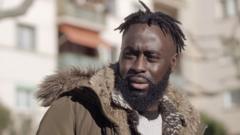In recent years, a notable phenomenon has emerged among French Africans, leading to what has been termed a "silent exodus" from France to Senegal, their ancestral homeland. This trend is epitomized by individuals like Menka Gomis, a 39-year-old Parisian who has decided to leave behind his life in France to set up a travel agency in Senegal. Gomis' motivations are tied to both a deep-rooted desire to reconnect with his roots as well as a belief in the economic prospects that Africa holds.
Born in France to Senegalese parents, Gomis reflects on the reality of growing up in an environment marked by racism. He recounts traumatic childhood experiences, such as being subjected to racial slurs at an early age. His feelings resonate with a growing number of French Africans who are disillusioned by increasing xenophobia and discrimination in French society, compelling them to redefine their identities and futures.
BBC Africa Eye's investigation highlights that many of these migrants view Africa as the "continent of the future," akin to the gold rush in America, where untapped opportunities abound. Yet, this migration is not without complexity. Gomis's mother struggles to understand her son's decision, but he insists it is not simply an "African dream"—it is also a response to a harsh reality in France.
The documentary further illustrates how societal tensions in France, heightened by recent events such as the riots following police violence against minorities, contribute to this migration. Fanta Guirassy and Audrey Monzemba, who are also eyeing potential moves to Senegal, echo similar sentiments—both expressing discomfort regarding safety and the treatment of ethnic minorities in their home country.
As the French government enacts stricter immigration laws, the climate for citizens of Muslim descent appears increasingly challenging. Statistical data reveals a stark rise in recorded racist incidents last year and a prevailing sentiment among French Muslims that they face systemic discrimination.
However, while some are excited about the prospects that await them in Senegal, including cultural reconnection and career opportunities, they also confront the reality of facing challenges in their new settings. Salamata Konte, who left a high-paying banking job in Paris for entrepreneurship in Dakar, describes her experience of navigating acceptance in a society where gender roles remain traditional.
Despite the hurdles, Gomis looks forward to the possibilities ahead, including launching a new dating app tailored for Senegalese users as he anticipates obtaining his Senegalese citizenship. For those participating in this silent exodus, the journey represents not only a physical relocation but also a profound quest for identity, belonging, and opportunities that are increasingly perceived as elusive in France.
Born in France to Senegalese parents, Gomis reflects on the reality of growing up in an environment marked by racism. He recounts traumatic childhood experiences, such as being subjected to racial slurs at an early age. His feelings resonate with a growing number of French Africans who are disillusioned by increasing xenophobia and discrimination in French society, compelling them to redefine their identities and futures.
BBC Africa Eye's investigation highlights that many of these migrants view Africa as the "continent of the future," akin to the gold rush in America, where untapped opportunities abound. Yet, this migration is not without complexity. Gomis's mother struggles to understand her son's decision, but he insists it is not simply an "African dream"—it is also a response to a harsh reality in France.
The documentary further illustrates how societal tensions in France, heightened by recent events such as the riots following police violence against minorities, contribute to this migration. Fanta Guirassy and Audrey Monzemba, who are also eyeing potential moves to Senegal, echo similar sentiments—both expressing discomfort regarding safety and the treatment of ethnic minorities in their home country.
As the French government enacts stricter immigration laws, the climate for citizens of Muslim descent appears increasingly challenging. Statistical data reveals a stark rise in recorded racist incidents last year and a prevailing sentiment among French Muslims that they face systemic discrimination.
However, while some are excited about the prospects that await them in Senegal, including cultural reconnection and career opportunities, they also confront the reality of facing challenges in their new settings. Salamata Konte, who left a high-paying banking job in Paris for entrepreneurship in Dakar, describes her experience of navigating acceptance in a society where gender roles remain traditional.
Despite the hurdles, Gomis looks forward to the possibilities ahead, including launching a new dating app tailored for Senegalese users as he anticipates obtaining his Senegalese citizenship. For those participating in this silent exodus, the journey represents not only a physical relocation but also a profound quest for identity, belonging, and opportunities that are increasingly perceived as elusive in France.


















